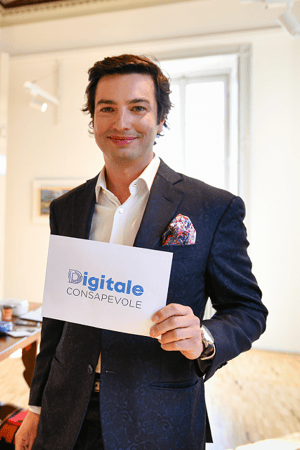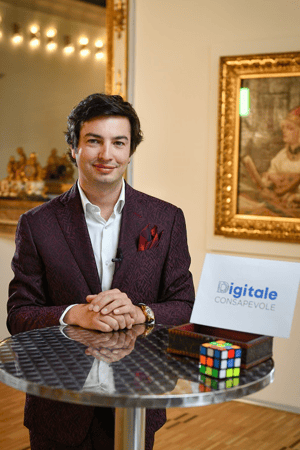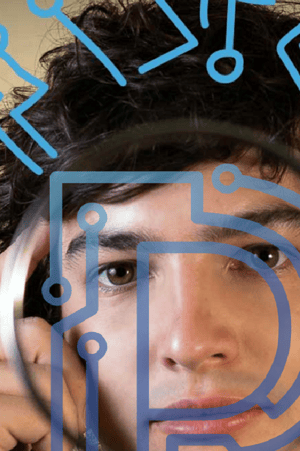
Digital Awareness
The project stems from the collaboration with Lugano Living Lab, the urban laboratory of the City of Lugano. It is part of their respective dissemination activities with the aim of promoting conscious use of technology, especially among children and young people.
Mentalism as the key to unveiling the digital
What are the tricks of the digital world and how to unveil them? The Swiss mentalist Federico Soldati will help us.
One aspect that technology, in particular so-called persuasive technologies, has in common with performing arts such as magic and mentalism is the role of psychology: research into attention and the diversion of attention (so-called misdirection) is the crucial factor in a performance of mentalism, as well as in such technologies. Also contributing to the effectiveness of these techniques are the emotional reactions of participants or users, who can become particularly persuasive and impressionable.

Anche se ben consapevoli dei rischi o delle modalità di vendita online, ci troviamo sempre più esposti a tecniche avanzate di persuasione soprattutto in materia di acquisti che sfuggono al nostro controllo. Il trucco c’è e non si vede. Basta saperlo, affinché sia affare fatto anche per te!
Scopri il trucco
Durante la navigazione su siti web o social media si può incorrere in giochi, quiz o “challenges” percepiti come innocui ma che permettono di ricavare dati sensibili degli utenti e che possono essere utilizzati per frodi o rivelarsi pericolosi. Se indovini, vinci davvero?
Scopri il trucco
Se si producono dei contenuti per il web (post, video, foto…) essi possono essere fruiti e interpretati da pubblici diversi. Decidere a quale network comunicare e come: questa è una scelta autonoma e consapevole. Vuoi dirlo a tutti?
Scopri il trucco#affarefatto
How often does it happen that we browse a website where we regularly shop online and are shown the item we wanted to buy or the one we needed most?
It almost seems as if it is someone inside the computer who can 'magically' read our minds and knows our tastes and preferences perfectly. In reality, the trick is there and you can't see it!
The vast majority of online sales sites use various algorithms and recommendation systems that aim to store a variety of data about us. For example, the online sales platform Amazon stores our purchases, items we save in our wish list, items that other customers have bought after viewing similar products, and so on.
In this way, the algorithm is able to create an idea of what our tastes and preferences are, proposing what it thinks is best for us and very often it is #affarefatto!
#digitaleconsapevole per #affarefatto
What is recommended to us on online shopping sites is not magic or mind-reading, but may be due to our choices previously made and processed by an algorithm.
Although we may be well aware of the existence of online sales techniques, we are increasingly exposed, even unintentionally, to advanced persuasion techniques that are beyond our control.
These digital marketing strategies find links with mentalism techniques, placing the individual in front of predefined choices that seem to be made ad-hoc.
In these contexts, the users may perceive that they are making a purchase thinking that the compromise and their choice are the result only of their own stance, a real #affarefatto!
#voilà
How many times while surfing on a website or social media have we come across a quiz, a game or a challenge or an offer that caught our attention? But are we really so sure that there is no deception behind it?
There are in fact a large number of online scams that try to steal our sensitive data, referred to as 'phishing'. Phishing has an assonance with the word fishing, which means 'catching' in English. Just as the fish takes the bait, the aim of the phishing scam is to lure users into giving up their personal data with one quick action, as we would say with unpleasant surprise 'and voila, our data has been stolen as if by magic'.
To date, phishing attacks have grown dramatically. This figure is very indicative because although awareness of the subject is growing, attempts to defraud are more numerous every day and in increasingly persuasive ways. Phishers can use these methods to build up a fictitious profile that will try to convince us to take the bait (phishing) to their demands and then access our data, for instance.
#digitaleconsapevole per #voilà
Some techniques related to convincing a person through psychology can be found in the art of mentalism.
How then can we learn from mentalism to protect ourselves online?
By drawing parallels with mentalism, we try to understand how phishers can act and at the same time take online measures to protect ourselves from such actions, which are far removed in intent from a performance of mentalism.
#ticonosco
When we post a photo or video on social media, we take it for granted that it will only reach our followers.
But is this really the case? It really depends on how we decide to set up our social profile. However, a piece of content of ours could go outside our publication rules and be spread on other channels: it is enough for one of our contacts (follower) to download the photo in question and share it with others that we have already lost the management of our content. It is therefore important to be vigilant and aware when publishing online.
This issue is very important today, where everything we publish online constitutes our 'digital reputation'. Let us define this concept better: the term digital reputation (or online reputation or web reputation) refers to the reputation a natural or legal person may have online and is generally made up of the perception that web users have of that specific subject.
Every action one takes online, therefore, affects one's web reputation, since every behaviour and every piece of information found on the web contributes to forming the idea that the user creates for him/herself and the judgement that he/she makes with regard to a person. The vast majority of this information can be found in our social profiles and in what we post. It should be remembered that the choice of the network to which we want to communicate is ours.
#digitaleconsapevole per #ticonosco
Some techniques related to the perception of a person and how much we can discover about a person through a few clues can be found in the art of mentalism.
How can we learn from mentalism to participate more consciously online?
With a proposal of parallels with mentalism we try to understand some practices related to the world of online reputation, to ask ourselves in the end: thanks to online information we can say that we know ourselves a little: but is that what we want?
Digitale tra illusione e realtà
Il progetto Digitale Consapevole è stato presentato per la prima volta durante l'evento “Digitale tra illusione e realtà”, che si è svolto il 17 settembre 2022 a conclusione della settimana Let’s Science!.
